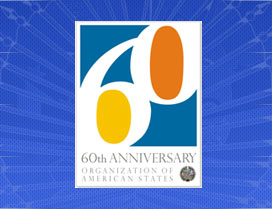 On May 14th 2008 the Americas Society/Council of the Americas and the National Endowment of Democracy hosted the Secretary-General of the OAS, H.E. José Miguel Insulza in their offices in New York to discuss how the OAS is helping develop democracy and democratic institutions within modern Latin America. With the current state of affairs in Latin America, democracy in its true form is a strong contender in many Latin American nations. As the historical forum of discussion and voice for the states of Latin America, progress and diplomacy has always worked best with the assistance of the OAS and the Americas community in resolving issues in the region.
On May 14th 2008 the Americas Society/Council of the Americas and the National Endowment of Democracy hosted the Secretary-General of the OAS, H.E. José Miguel Insulza in their offices in New York to discuss how the OAS is helping develop democracy and democratic institutions within modern Latin America. With the current state of affairs in Latin America, democracy in its true form is a strong contender in many Latin American nations. As the historical forum of discussion and voice for the states of Latin America, progress and diplomacy has always worked best with the assistance of the OAS and the Americas community in resolving issues in the region.
The future of Latin America is often seen in two perspectives. One is the US and its approach to other countries in the Americas. Many in the United States see Latin America as its proper sphere of influence. While many in Latin America would prefer an increasingly independent status, the reality of geopolitics is that for better or for worse, the United States has had a lot of power in determining the future of Latin America via economic relationships, political ties and support to groups and officials in various Latin American countries. The question now is based on how the US wants to approach the region in the future. With economic successes in Mexico and Brazil and Chile, and diplomatic challenges with Venezuela and Bolivia and a mix of both with every other country, the opportunity to reengage after five years in Iraq will determine how the US progresses in the future as a regional power or a source of conflict for many of its neighbours.
In his new book The Second World and in an interview with Edward Baker of Strategy+Business, Parag Khanna of the New America Foundation discusses how the future of geopolitics will likely take shape in the future. With power becoming divided among China, the US and the EU, many regions of influence which he refers to as the Second World will often become influenced by one of the three main powers. These middle powers have yet to determine which influence they wish to presume, but as Khanna points out the opportunity for influence comes only from those powers and their ability to coordinate their diplomacy in a productive fashion. As with Latin America and the OAS, the region is essentially available for diplomacy and will be the determining factor of future influence of the US in the near future. Isolationism and the fear of working within the international community will only hurt the US in the future. The OAS and Latin America is seen as the answer for many, as Edward Baker states: "The answer lies right under our noses."
For Video of the May 14th discussion with the OAS click here.
For a Video Interview by Charlie Rose with Parag Khanna click here.
For further discussion ofthe issue of US influence in the World, see The Washington Post article The Rise of Non-Americanism by Fareed Zakaria by clicking here.

